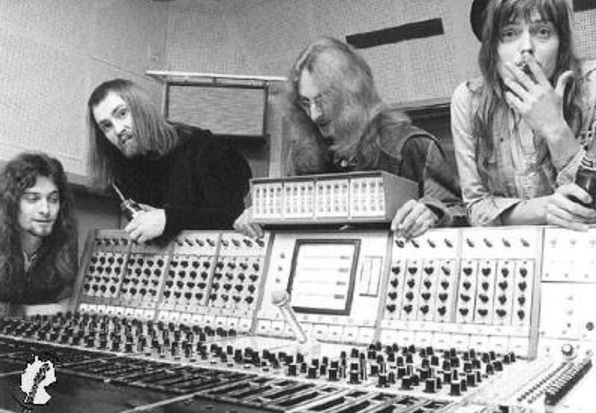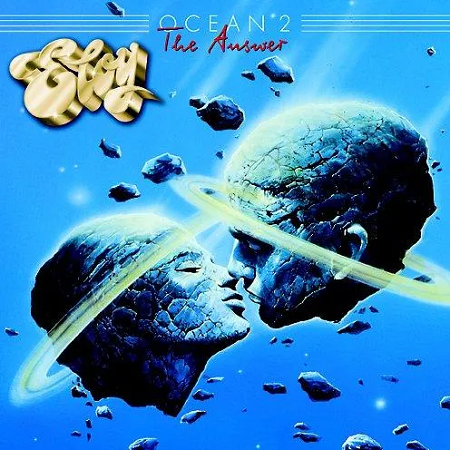Photos courtesy of Frank Bornemann
I will admit, there have been many times during this pandemic when my brain has been consumed by more negative thoughts than positive ones. Fear, paranoia, and anger were all front and center, with acceptance remaining an increasingly difficult concept to grasp – especially as we inch closer to the one-year mark of working from home and donning masks out in public in order to try to resemble normalized humanity.
Yet it hasn’t been all bad. One of the few uplifting things keeping me sane these past months has been music — particularly discovering the wonders of German progressive powerhouse Eloy. I thought I knew it all when it came to the genre, but Eloy – and their spectacular Ocean album – took me to another world. Maybe that was their intention all along considering their name is derived from a fictional human race existing 800,000 years in the future per H.G. Wells’ classic The Time Machine. Eloy has the unique trait of sounding well ahead of its time even when their more conceptual releases all seem to harken back to bygone eras.
“For me, the name [Eloi] was synonymous with a departure into a new future, and so I called the band the same,” band leader Frank Bornemann told me recently. “I only changed the last letter.”
The group is one of the few in progressive rock to not overtly change their musical formula, yet sound refreshed and dynamic with every album. If you go back to 1973’s Inside, it fits in wonderfully with the influential Krautrock movement. In fact, you’d be astonished to realize it isn’t actually a Can release. Spin Power And The Passion and Dawn on a turntable and try not envisioning Genesis or Yes recording the same type of album as they set about bringing Selling England By The Pound and Relayer to life, respectively. Even though group members would filter in and out through the years, Bornemann was (and still is) Eloy’s rock and primary champion. It’s his voice, his guitar, and his imagination that makes me wish their vinyl was easier to come by stateside.
Entering the 1980’s, Eloy’s sound became tighter and more synthesizer-driven, turning them into a wholly underrated hard rock act. While they would seem nonexistent within the fervor created by groups like Judas Priest and Iron Maiden, just listen to 1981’s stellar Planets and the titanic “Point of No Return” for proof. Or how about “Carried by Cosmic Winds,” which contains not only background melodies reminiscent of Kraftwerk’s “Autobahn,” but also heavenly choir vocals reaching for the skies.

Despite nearly 20 studio albums to their credit, the one that brought the band as close to universal fame and fortune as it would ever achieve is the aforementioned Ocean of 1977. A four-movement masterwork built around the legends of Poseidon and Atlantis and boasting more nautical imagery than Moby Dick, the album would meld the worlds of space, time travel, and other prevalent prog rock themes, yielding the kind of effort that should have taken the band out of its native Germany and into American arenas nationwide. The fact Bornemann, bassist Klaus-Peter Matziol, keyboardist Detley Schmidtchen, and drummer Jürgen Rosenthal had the guts to pull this off while the punk rock movement charged full steam ahead is even more genius.
“We always wanted to do something new and different with every album and reproduce as little as possible. In my opinion that should be the aspiration of every artist and band,” Bornemann told me.
I found Ocean by accident, letting it enter my ears via recommended music from YouTube. From listen one I was hooked. Beginning in April, I played the album almost daily, telling everyone I knew about it (I took particular joy in hearing from a friend he played it on loop during a 20-hour road trip). I even made sure my pandemic face mask was one containing the album’s cover on it. Something about its multi-faceted instrumentation, Bornemann’s sensual yet mysterious vocals, and the group’s collective storytelling makes Ocean entirely accessible. For those unable to plod through Yes’ epic Tales From Topographic Oceans, this makes for an even better prog primer…and TFTO is one of my all-time favorite albums.
Yet the circumstances leading to the album’s creation were anything but easy, according to Bornemann. After touring behind the album’s predecessor Dawn (1976), Eloy had little time to prepare for Ocean as their recording contract stipulated a new album had to be released no later than autumn 1977. Additionally, the group “lost their rehearsal room and had to shift operations to a dark World War II-era bunker” where over the course of a few weeks they assembled the new work.
Per Bornemann: “The idea of creating another concept album came from our drummer Jürgen Rosenthal, who already had specific ideas about it. The whole lyrical concept came from him, the music was created collectively. Jürgen chose the story and the myth of Atlantis, which at first glance seemed very esoteric to the other three musicians, and in some details also unusually gloomy. The lyrics only came when the music had almost completely been recorded, which then became a certain challenge for me personally, because we had already exceeded the production time at this point.
“Nevertheless, the album had a certain magic about it, which was further enhanced by the magnificent album cover painting by Woitek Siudmak. Epic musical arrangements and titles with overlong playing times were absolutely “en vogue” at that time, and so it surprised no one that the whole album consisted of only four titles.

The result? “Ocean became the biggest sales success in Germany, going gold, and “Poseidon’s Creation” became the most famous song in our repertoire,” Bornemann said.
Unfortunately, only a limited number of copies reached the US as exports. This trend first occurred years earlier as the band found its footing with studio albums. Ocean was Eloy’s fourth album released by EMI. After a not very successful self-titled debut album with Philipps, two musicians left the band in 1972. “Stylistic reorientation and personnel changes” would take place soon after before the group was signed to EMI’s Harvest label. This proved to be a personal achievement, Bornemann said, given the label’s roster also included legendary acts like Pink Floyd and Deep Purple “who we especially admired.”
Yet despite the mighty name of EMI backing Eloy, America didn’t take to Inside despite the track “Future City” garnering some AM and FM radio play. Floating, released in 1974, wouldn’t fare much better.
“With the following album, Floating, we remained on the road to success in Germany. The album was again released on the Janus label in the US,“ Bornemann told me. “Unfortunately, the company went bankrupt only a short time after the release, thus bringing Eloy’s promising career in America to a standstill.”
After the music industry’s dismissal of Eloy’s next album Power And The Passion (1975), the hat trick proved too much for certain members of the group, prompting their departure. Encouraged by the managing director of EMI Germany though, Bornemann reformed Eloy and in 1976 produced the album Dawn, which made the group “the most successful rock band in Germany.”
“However, international success was initially limited to neighboring European countries, as EMI in the other territories put their interests with their own artists first. The company policies of the majors also meant there were only limited possibilities to push our career abroad because sound carriers were only available in limited quantities in other countries via export from Germany. The exclusive artist contract, which was common for major companies worldwide at that time, thus proved to be a considerable obstacle. Opening up markets outside of Germany was hampered and not really conducive to the band’s career. The American market therefore remained closed to us except for a strictly limited export volume,” Bornemann said.
Without a well-promoted and successful album release, a concert tour abroad proved “pointless and had no chance of success,” he adds.
And then came Ocean. Overall, here is why I love this album so much:
- “Poseidon’s Creation” has the musicality of a symphony, with hypnotic and thematic motifs as well as a three-movement mindset that easily rivals the soundtrack of any sea epic.
- “Incarnation of Logos” revels in ambiance before shifting to a wondrous ballet of bass and synthesizer that sounds as sensual as the standout allusion to gods making love.
- “Decay of Logos” is Bornemann as master storyteller – he paints and depicts a cinematic experience replete with psychedelic echo and standout guitar work.
- You simply have to love a 15-minute song titled “Atlantis’ Agony at June 5th – 8498, 13 p.m. Gregorian Earthtime” that recalls the organ work of Deep Purple’s Jon Lord, forecasts the future, and ends on an ambiguous note – as if to signal the story doesn’t end here.
- Spoiler alert – turns out it doesn’t. Eloy would release Ocean 2: The Answer in 1998.
“The reason why so many Eloy fans highlight Ocean is no doubt due to the fact that this album was completely out of the ordinary in terms of music and content, but also structurally. It was beyond comparison, which proved to be successful in the end, and obviously belonged [in] the record collection of every art or progressive rock fan,” Bornemann said. “There were certainly, all in all, better albums from the band, but certainly none that seemed as impenetrable and esoteric as Ocean. It was simply a unique piece of work, which resulted from the fact that everyone in the band was striving to create something special and was enormously motivated to contribute to it.”
The great thing about Ocean is that after its release, Eloy never suffered any kind of follow-up jinx. A good chunk of the band’s albums following this behemoth are just as exciting and enigmatic to listen to. Take for example, 1979’s Silent Cries And Mighty Echoes, the previously mentioned Planets, and 1982’s Time to Turn. To this day, Bornemann never rests on his laurels; Eloy’s grandest conceptual effort, arguably to date, is a two-volume work telling the narrative of Joan of Arc entitled The Vision, The Sword & The Pyre. Part one came out in 2017 and part two, 2019.
“The sound of the band always had a distinctive signature across all line-ups that enabled us to build up a loyal fan base which has lasted for many decades,” he says.
So if you’re like me, and trying to find a unique kind of escape from a situation still beyond our control, I would recommend taking the listening plunge with Ocean — and Eloy for that matter. It’s not every day you find a band that can offer this type of panacea to cure what ails us!

***
Share your feedback and suggestions for future columns with Ira at vinylconfessions84@gmail.com. Ira’s new book, “Hello, Honey, It’s Me”: The Story of Harry Chapin, is available for purchase here.




















